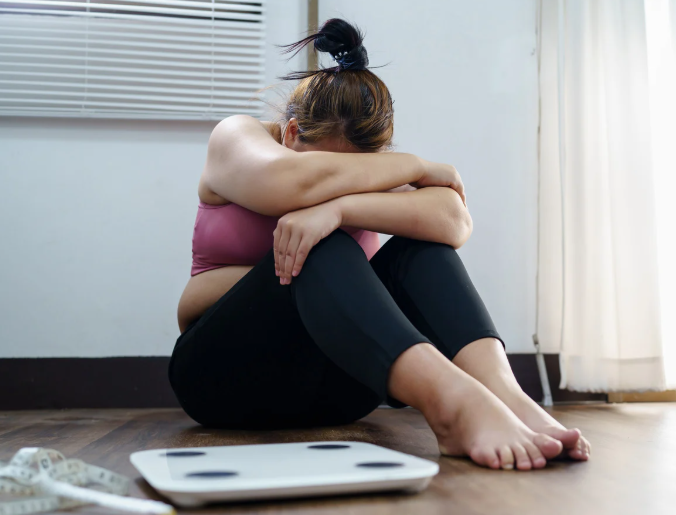You’ve probably heard the saying:
“Weight loss is simple—just eat fewer calories than you burn.”
But once you hit your 40s, many women find themselves eating well, moving regularly, and still gaining weight—or struggling to lose it. The truth is, the equation still technically works, but the variables have changed.
Let’s unpack why things shift in your 40s, and what you can do to work with your body—not against it.
1. Hormones Are Changing
In your 40s, your body starts gearing up for menopause. This transitional phase, known as perimenopause, can begin several years before your periods stop completely.
-
Oestrogen begins to decline, but it doesn’t do so in a straight line. It can fluctuate wildly—some days high, some days low—causing a rollercoaster of symptoms.
-
Oestrogen affects how your body stores fat, and lower levels can lead to increased fat storage, particularly around the abdomen.
-
It also impacts insulin sensitivity, which can affect how easily your body uses carbohydrates.
-
Changes in progesterone can contribute to bloating and water retention, adding to feelings of heaviness or puffiness.
📝 What you can do:
Support hormonal balance by focusing on whole, unprocessed foods, reducing alcohol and sugar, and building routines that help regulate stress (see below!).
2. Your Metabolism Naturally Slows Down
As we age, we tend to lose muscle mass, unless we actively work to maintain or build it. This process, known as sarcopenia, starts in your 30s and accelerates in your 40s.
Why does this matter?
-
Muscle burns more calories at rest than fat. So the less muscle you have, the fewer calories you burn doing absolutely nothing.
-
If you continue to eat the same amount you did in your 30s, you may slowly gain weight—even if your diet hasn’t changed.
📝 What you can do:
-
Prioritise strength training (even just 2–3 times per week) to maintain lean muscle mass.
-
Add more protein to your meals to support muscle repair and growth.
3. Insulin Sensitivity Decreases
As oestrogen drops, insulin sensitivity can decline, making it harder for your body to process glucose efficiently.
This can lead to:
-
More cravings for carbs and sugar
-
More fat storage (especially in the abdominal area)
-
Energy crashes and brain fog
This also means your blood sugar is more likely to spike and dip, which can make it harder to feel satisfied after meals and control hunger throughout the day.
📝 What you can do:
-
Focus on balanced meals with protein, fibre, and healthy fats to slow down blood sugar spikes.
-
Avoid long gaps between meals if you find that leads to cravings or crashes.
-
Try gentle movement after meals (like a short walk) to help stabilise blood sugar.
4. Stress & Cortisol Have a Bigger Impact
Life in your 40s is often… a lot. Careers, relationships, children, ageing parents—it all adds up. Chronic stress means higher levels of cortisol, your body’s main stress hormone.
Why cortisol matters:
-
It can trigger cravings (especially for sweet, salty, or fatty foods)
-
It promotes fat storage, especially around the midsection
-
It can make it harder to sleep, which in turn affects hunger and metabolism
📝 What you can do:
-
Create pockets of calm during your day: a 5-minute breathing exercise, a quiet tea break, or a walk outside.
-
Don’t underestimate rest. Pushing harder when you’re burned out doesn’t help your body or your metabolism.
-
Try mindfulness, journaling, or gentle yoga to reduce the impact of chronic stress.
5. Sleep Becomes Trickier
Hormonal changes often disrupt sleep. Many women report trouble falling asleep, staying asleep, or waking up feeling unrefreshed.
Poor sleep affects your:
-
Hunger hormones: It raises ghrelin (which makes you hungry) and lowers leptin (which signals fullness).
-
Mood and willpower: You’re more likely to reach for quick energy (hello, sugar and caffeine) when you’re exhausted.
-
Metabolism: Studies show even a few nights of poor sleep can lead to insulin resistance and fat gain.
📝 What you can do:
-
Build a calming bedtime routine: dim lights, no screens, warm showers, light stretching.
-
Cut back on alcohol and caffeine, especially later in the day.
-
Aim for consistent sleep and wake times, even on weekends.
6. Lifestyle Habits Quietly Shift
Let’s be realistic—many women in their 40s are pulled in a hundred directions. Exercise might slip to the bottom of the list. You might find yourself eating on the go, skipping meals, or grabbing whatever’s convenient.
On top of that:
-
Your non-exercise activity (walking, cleaning, moving around during the day) might decrease without you noticing.
-
You may still be eating like you’re in your 30s, even though your body’s needs have changed.
📝 What you can do:
-
Look for simple ways to move more—short walks, stretching during meetings, or dancing while you cook.
-
Keep snacks and meals protein-rich and balanced to help manage appetite and energy.
-
Start tracking habits, not just calories—look at sleep, stress, hydration, mood, and movement too.
Final Thoughts: It’s Not Broken—It’s Just Different
The calories in/calories out model hasn’t stopped working—it just needs adjusting. Your 40s are a time of transition, but with a few mindful changes, your body can feel strong, energised, and balanced again.
You don’t need to go to extremes or overhaul your life.
Small, consistent changes that support your hormones, sleep, stress, and muscle will pay off more than any strict diet ever could.
Yours truly,
Corinne




